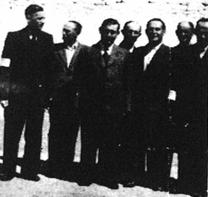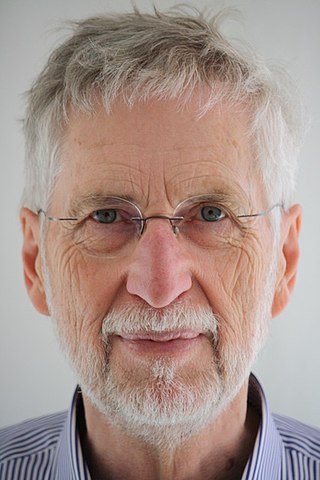
Doron Rabinovici is an Israeli-Austrian writer, historian and essayist. He was born in Tel Aviv in 1961, and moved to Vienna in 1964. His literary work includes short stories, novels and essays, but also drama.

Doron Rabinovici is an Israeli-Austrian writer, historian and essayist. He was born in Tel Aviv in 1961, and moved to Vienna in 1964. His literary work includes short stories, novels and essays, but also drama.
Doron Rabinovici was born in Israel on December 2, 1961, [1] but the family moved to Vienna in 1964. Rabinovici studied at the University of Vienna and received his doctorate in 2000 with the historical work Instanzen der Ohnmacht. [2] The Viennese Jewish community leadership from 1938 to 1945 and their reaction to National Socialist persecution and extermination. Rabinovici's doctoral thesis concerns the reaction of the Viennese Jewish community's administration to the persecution by the National Socialists and the community's consequent extermination. Published in 2000 as Instanzen der Ohnmacht (Authorities of Powerlessness) by Jüdischer Verlag (a branch of Suhrkamp), it raises the painful questions of resistance and collusion that have come to dominate recent debates on the Holocaust. The study was published in English by Polity Books in 2011 under the title Eichmann's Jews. [3]
Doron Rabinovici not only writes literary texts such as the short story collection Papirnik (1994) or the novels Suche nach M. (1999), Ohnehin (2004), Andernorts (2010), Die Außerirdischen (2017) and Die Einstellung (2022), but also numerous non-fictional texts in which he comments on developments in Austria and politics. He also provides information on Jewish identity, but also on poetological considerations, such as his writing intentions or the role of literature.
Rabinovici's first novel, Suche nach M (1997), deals with the aftermath of extermination. His other novels also repeatedly deal with dealing with memory, the Nazi past, foreignness, migration, right-wing extremism in Austria and Jewish life in Vienna.
In 2013 and 2014, he initiated and conceived the production "Die letzten Zeugen" at the Burgtheater together with Matthias Hartmann. The production staged the memory of seven survivors. The performance was set on the main stage of the Burgtheater. The testimonies of the seven survivors were based on their books or on interviews with them. The texts are recited by four actors. Rabinovici compiled the text book for the performance; the production referred to the November pogroms of 1938, the 75th anniversary of which was celebrated in 2013.
In 2018, based on an idea by Florian Klenk, Doron Rabinovici put together the drama collage "Anything can happen!" A political theater, a mosaic of speeches and statements by Europe's racist populist government politicians that reveals the nature and intentions of these policies. The reading is merely commented on by individual quotations from Hannah Arendt, Viktor Klemperer and Erich Kästner and is framed by a few sentences written by Rabinovici. "Anything can happen!"(Original title: Alles kann passieren!) has been performed several times at the Burgtheater and other German-speaking stages. [4]
Doron Rabinovici is a member of the board of the Grazer Autorinnen Autorenversammlung. He has been an associate member of the Mainz Academy of Sciences and Literature since 2018. [5]
Doron Rabinovici's mother, Shoshana Rabinovici, comes from Vilnius, the capital of Lithuania, then still Poland, survived the ghetto, concentration camps and the death march and came to Israel in the 1950s. Schoschana Rabinovici described the story of her survival in her book Thanks to My Mother. [6] His father, David Rabinovici, fled from Romania to Palestine in 1944.
2014: Abrahams Stunde; Production Hessischer Rundfunk with Österreichischer Rundfunk; Director: Götz Fritsch, Dramaturgy: Ursula Ruppel
Since 1986, Rabinovici has been speaker of the Republican Club New Austria, an intellectual group that was formed against the background of the anti-Semitic presidential campaign of Kurt Waldheim. In 1999, Rabinovici became the speaker of Demokratische Offensive (Democratic Offensive), a movement geared to mobilize the Austrian civil society against the threat of a center-right coalition with Haider's extreme right-wing party. The Demokratische Offensive called for mass demonstrations against racism. The response was overwhelming – in February 2000, 300,000 people assembled on Vienna's historic Heldenplatz to stage the largest demonstration in Austria's post-war history.
Gonzalés-Vangell, Béatrice. Kaddish et Renaissance, La Shoah dans les romans viennois de Robert Schindel, Robert Menasse et Doron Rabinovici, Septentrion, Valenciennes, 2005, 348 pages
Simões, Anabela Valente. “Pós-memória e pertença identitária no romance Andernorts de Doron Rabinovici”, in: Martins, Catarina, Claudia Ascher e Rogério Madeira (Org.), Em Trânsito – Übergänge: Grenzen überschreiten in der Germanistik, REAL - Revista de Estudos Alemães, 2012, pp. 56–67.
Simões, Anabela Valente. “Identidade, memória e esquecimento no romance Ohnehin de Doron Rabinovici”, REAL - Revista de Estudos Alemães, 1, 2010, pp. 20–36.

A Judenrat was an administrative body established in German-occupied Europe during World War II which purported to represent a Jewish community in dealings with the Nazi authorities. The Germans required Jews to form Judenräte across the occupied territories at local and sometimes national levels.

Karl Kraus was an Austrian writer and journalist, known as a satirist, essayist, aphorist, playwright and poet. He directed his satire at the press, German culture, and German and Austrian politics. He was nominated for the Nobel Prize in Literature three times.

Hermann Broch was an Austrian writer, best known for two major works of modernist fiction: The Sleepwalkers and The Death of Virgil.

Peter Sloterdijk is a German philosopher and cultural theorist. He is a professor of philosophy and media theory at the University of Art and Design Karlsruhe. He co-hosted the German television show Im Glashaus: Das Philosophische Quartett from 2002 until 2012.

Elfriede Jelinek is an Austrian playwright and novelist. She is one of the most decorated authors to write in German and was awarded the 2004 Nobel Prize in Literature for her "musical flow of voices and counter-voices in novels and plays that, with extraordinary linguistic zeal, reveal the absurdity of society's clichés and their subjugating power". She is considered to be among the most important living playwrights of the German language.

Robert Menasse is an Austrian writer.
Austrian literature is mostly written in German, and is closely connected with German literature.

Marcel Beyer is a German writer.

Friederike Mayröcker was an Austrian writer of poetry and prose, audio plays, children's books and dramatic texts. She experimented with language, and was regarded as an avantgarde poet, and as one of the leading authors in German. Her work, inspired by art, music, literature and everyday life, appeared as "novel and also dense text formations, often described as 'magical'." According to The New York Times, her work was "formally inventive, much of it exploiting the imaginative potential of language to capture the minutiae of daily life, the natural world, love and grief".

Ursula Krechel is a German writer.

Prof. Dr. Hans-Ulrich Treichel is a Germanist, novelist and poet. His earliest published books were collections of poetry, but prose writing has become a larger part of his output since the critical and commercial success of his first novel Der Verlorene. Treichel has also worked as an opera librettist, most prominently in collaboration with the composer Hans Werner Henze.

Ernest Wichner is a German writer, editor, and literary translator of Banat Swabian origin.

Silke Scheuermann is a German poet and novelist. She was educated in Frankfurt, Leipzig, and Paris. She is best known for her debut novel Die Stunde zwischen Hund und Wolf, which has been translated into ten languages including English. She has won numerous German and European literary prizes and fellowships, including the Georg-Christoph-Lichtenberg-Preis, the Leonce-und-Lena-Preis, the Hölty Prize, the Bertolt-Brecht-Literaturpreis, and a Villa Massimo fellowship.

Volker Hage is a retired German journalist, author and literary critic, who has reinvented himself as a novelist.

Jürgen Becker is a German poet, prose writer and radio play author. He won the 2014 Georg Büchner Prize.

Marion Poschmann is a German author, novelist, and poet.

Ilma Rakusa is a Swiss writer and translator. She translates French, Russian, Serbo-Croatian and Hungarian into German.

Robert Schindel is an Austrian lyricist, director and author.
Benedikt David Arnstein, also known by the pen name Arenhof, was an Austrian playwright. He is considered the first German-language Jewish dramatist and poet.

Ulla Berkéwicz is a German actress, author and publisher. The name "Berkéwicz", which she adopted in 1968 as a stage name, and by which she has since become generally known, is derived from the family name used by her Jewish grandmother, "Berkowitz".